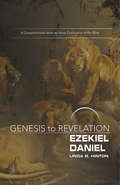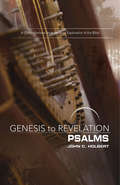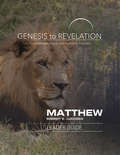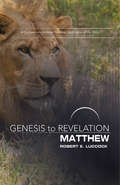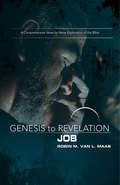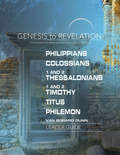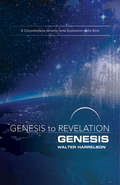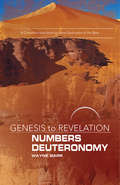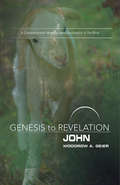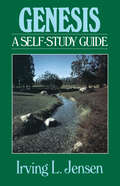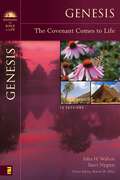- Table View
- List View
Genesis to Revelation: A Comprehensive Verse-by-Verse Exploration of the Bible (Genesis to Revelation series)
by Keith SchovilleStudy the entire books of Hebrews; James; First and Second Peter; First, Second, and Third John; and Jude, including the uniqueness of God's final revelation for the salvation of the people, essential instruction in the faith, strengthening faith in the midst of the difficulties of life, faith and works, fellowship with God and with other believers, encouragement to be ruled by love, and the spiritual health of the church. Some of the major ideas explored are: developing a personal relationship with Christ; running the race of life; your Christian experience; your influence in the life of your church; Jesus as a historical person; the second coming of Christ; and Christian hospitality.More than 3.5 million copies of the series have been sold.This revision of the Abingdon classic Genesis to Revelation Series is a comprehensive, verse-by-verse, book-by-book study of the Bible based on the NIV. These studies help readers strengthen their understandingand appreciation of the Bible by enabling them to engage the Scripture on three levels: What does the Bible say? Questions to consider while reading the passage for each session. What does the passage mean? Unpacks key verses in the selected passage. How does the Scripture relate to my life? Provides three major ideas that have meaning for our lives today. The meaning of the selected passages are made clear by considering such aspects as ancient customs, locations of places, and the meanings of words. The simple format makes the study easy to use.Updates will include: New cover designs. New interior designs. Leader Guide per matching Participant Book (rather than multiple volumes in one book). Updated to 2011 revision of the New International Version Translation (NIV). Updated references to New Interpreters Dictionary of the Bible. Include biblical chapters on the contents page beside session lesson titles for at-a-glance overview of biblical structure.The simple format makes the study easy to use. Each volume is 13 sessions and has a separate leader guide.
Genesis to Revelation: A Comprehensive Verse-by-Verse Exploration of the Bible (Genesis to Revelation series)
by Linda B. HintonStudy the books of Ezekiel and Daniel, beginning with Ezekiel’s story, and then moving on to tell Daniel’s story. Some of the major ideas explored are: learning of God, obedience to God, false prophecy, cleansing and renewal, Godly wisdom, and the endtime and meantime.Leader Guide includes: A verse-by-verse, in-depth look at the Scriptures. Background material, including word studies and history of the biblical setting. Answers to questions asked in the Participant Book. Application of the Scripture to daily life situations. Discussion suggestions. A variety of study options. Practical tips for leaders to use.More than 3.5 million copies of the series have been sold.This revision of the Abingdon classic Genesis to Revelation Series is a comprehensive, verse-by-verse, book-by-book study of the Bible based on the NIV. These studies help readers strengthen their understanding and appreciation of the Bible by enabling them to engage the Scripture on three levels: What does the Bible say? Questions to consider while reading the passage for each session. What does the passage mean? Unpacks key verses in the selected passage. How does the Scripture relate to my life? Provides three major ideas that have meaning for our lives today. The meaning of the selected passages are made clear by considering such aspects as ancient customs, locations of places, and the meanings of words.The meaning of the selected passages are made clear by considering such aspects as ancient customs, locations of places, and the meanings of words. The simple format makes the study easy to use. Includes maps and glossary with key pronunciation helps.Updates will include: New cover designs. New interior designs. Leader Guide per matching Participant Book (rather than multiple volumes in one book). Updated to 2011 revision of the New International Version Translation (NIV). Updated references to New Interpreters Dictionary of the Bible. Include biblical chapters on the contents page beside session lesson titles for at-a-glance overview of biblical structure. Include larger divisions within the contents page to reflect macro-structure of each biblical book. Ex: Genesis 1-11; Genesis 12-50; Exodus 1-15; Exodus 16-40; Isaiah 1-39; Isaiah 40-66.The simple format makes the study easy to use. Each volume is 13 sessions.
Genesis to Revelation: A Comprehensive Verse-by-Verse Exploration of the Bible (Genesis to Revelation series)
by Linda B. HintonStudy the books of Ezekiel and Daniel, beginning with Ezekiel’s story, and then moving on to tell Daniel’s story. Some of the major ideas explored are: learning of God, obedience to God, false prophecy, cleansing and renewal, Godly wisdom, and the endtime and meantime.More than 3.5 million copies of the series have been sold.This revision of the Abingdon classic Genesis to Revelation Series is a comprehensive, verse-by-verse, book-by-book study of the Bible based on the NIV. These studies help readers strengthen their understanding and appreciation of the Bible by enabling them to engage the Scripture on three levels: What does the Bible say? Questions to consider while reading the passage for each session. What does the passage mean? Unpacks key verses in the selected passage. How does the Scripture relate to my life? Provides three major ideas that have meaning for our lives today. The meaning of the selected passages are made clear by considering such aspects as ancient customs, locations of places, and the meanings of words.The meaning of the selected passages are made clear by considering such aspects as ancient customs, locations of places, and the meanings of words. The simple format makes the study easy to use. Includes maps and glossary with key pronunciation helps.Updates will include: New cover designs. New interior designs. Leader Guide per matching Participant Book (rather than multiple volumes in one book). Updated to 2011 revision of the New International Version Translation (NIV). Updated references to New Interpreters Dictionary of the Bible. Include biblical chapters on the contents page beside session lesson titles for at-a-glance overview of biblical structure. Include larger divisions within the contents page to reflect macro-structure of each biblical book. Ex: Genesis 1-11; Genesis 12-50; Exodus 1-15; Exodus 16-40; Isaiah 1-39; Isaiah 40-66.The simple format makes the study easy to use. Each volume is 13 sessions and has a separate leader guide.
Genesis to Revelation: A Comprehensive Verse-by-Verse Exploration of the Bible (Genesis to Revelation series)
by Lloyd BaileyStudy the Book of Isaiah, beginning with the oracles against Judah and ending with a vision of the New Jerusalem. Some of the major ideas explored are: ingratitude of the blessed, a golden age, who is God, authorship, what is God like, and Utopia.Leader Guide includes: A verse-by-verse, in-depth look at the Scriptures. Background material, including word studies and history of the biblical setting. Answers to questions asked in the Participant Book. Application of the Scripture to daily life situations. Discussion suggestions. A variety of study options. Practical tips for leaders to use.More than 3.5 million copies of the series have been sold.This revision of the Abingdon classic Genesis to Revelation Series is a comprehensive, verse-by-verse, book-by-book study of the Bible based on the NIV. These studies help readers strengthen their understanding and appreciation of the Bible by enabling them to engage the Scripture on three levels: What does the Bible say? Questions to consider while reading the passage for each session. What does the passage mean? Unpacks key verses in the selected passage. How does the Scripture relate to my life? Provides three major ideas that have meaning for our lives today. The meaning of the selected passages are made clear by considering such aspects as ancient customs, locations of places, and the meanings of words.The meaning of the selected passages are made clear by considering such aspects as ancient customs, locations of places, and the meanings of words. The simple format makes the study easy to use. Includes maps and glossary with key pronunciation helps.Updates will include: New cover designs. New interior designs. Leader Guide per matching Participant Book (rather than multiple volumes in one book). Updated to 2011 revision of the New International Version Translation (NIV). Updated references to New Interpreters Dictionary of the Bible. Include biblical chapters on the contents page beside session lesson titles for at-a-glance overview of biblical structure. Include larger divisions within the contents page to reflect macro-structure of each biblical book. Ex: Genesis 1-11; Genesis 12-50; Exodus 1-15; Exodus 16-40; Isaiah 1-39; Isaiah 40-66.The simple format makes the study easy to use. Each volume is 13 sessions.
Genesis to Revelation: A Comprehensive Verse-by-Verse Exploration of the Bible (Genesis to Revelation series)
by Lloyd BaileyStudy the Book of Isaiah, beginning with the oracles against Judah and ending with a vision of the New Jerusalem. Some of the major ideas explored are: ingratitude of the blessed, a golden age, who is God, authorship, what is God like, and Utopia.More than 3.5 million copies of the series have been sold.This revision of the Abingdon classic Genesis to Revelation Series is a comprehensive, verse-by-verse, book-by-book study of the Bible based on the NIV. These studies help readers strengthen their understanding and appreciation of the Bible by enabling them to engage the Scripture on three levels: What does the Bible say? Questions to consider while reading the passage for each session. What does the passage mean? Unpacks key verses in the selected passage. How does the Scripture relate to my life? Provides three major ideas that have meaning for our lives today. The meaning of the selected passages are made clear by considering such aspects as ancient customs, locations of places, and the meanings of words.The meaning of the selected passages are made clear by considering such aspects as ancient customs, locations of places, and the meanings of words. The simple format makes the study easy to use. Includes maps and glossary with key pronunciation helps.Updates will include: New cover designs. New interior designs. Leader Guide per matching Participant Book (rather than multiple volumes in one book). Updated to 2011 revision of the New International Version Translation (NIV). Updated references to New Interpreters Dictionary of the Bible. Include biblical chapters on the contents page beside session lesson titles for at-a-glance overview of biblical structure. Include larger divisions within the contents page to reflect macro-structure of each biblical book. Ex: Genesis 1-11; Genesis 12-50; Exodus 1-15; Exodus 16-40; Isaiah 1-39; Isaiah 40-66.The simple format makes the study easy to use. Each volume is 13 sessions and has a separate leader guide.
Genesis to Revelation: A Comprehensive Verse-by-Verse Exploration of the Bible (Genesis to Revelation series)
by Orion N. HutchinsonStudy the entire Book of Mark, starting with the beginning of the gospel and ending with the movement from darkness to light. Some of the major ideas explored are: the master teacher, the miracle worker, down from the mountain, and the last mile of the way.Leader Guide includes: A verse-by-verse, in-depth look at the Scriptures. Background material, including word studies and history of the biblical setting. Answers to questions asked in the Participant Book. Application of the Scripture to daily life situations. Discussion suggestions. A variety of study options. Practical tips for leaders to use.More than 3.5 million copies of the series have been sold.This revision of the Abingdon classic Genesis to Revelation Series is a comprehensive, verse-by-verse, book-by-book study of the Bible based on the NIV. These studies help readers strengthen their understanding and appreciation of the Bible by enabling them to engage the Scripture on three levels: What does the Bible say? Questions to consider while reading the passage for each session. What does the passage mean? Unpacks key verses in the selected passage. How does the Scripture relate to my life? Provides three major ideas that have meaning for our lives today. The meaning of the selected passages are made clear by considering such aspects as ancient customs, locations of places, and the meanings of words.The meaning of the selected passages are made clear by considering such aspects as ancient customs, locations of places, and the meanings of words. The simple format makes the study easy to use. Includes maps and glossary with key pronunciation helps.Updates will include: New cover designs. New interior designs. Leader Guide per matching Participant Book (rather than multiple volumes in one book). Updated to 2011 revision of the New International Version Translation (NIV). Updated references to New Interpreters Dictionary of the Bible. Include biblical chapters on the contents page beside session lesson titles for at-a-glance overview of biblical structure. Include larger divisions within the contents page to reflect macro-structure of each biblical book. Ex: Genesis 1-11; Genesis 12-50; Exodus 1-15; Exodus 16-40; Isaiah 1-39; Isaiah 40-66.The simple format makes the study easy to use. Each volume is 13 sessions.
Genesis to Revelation: A Comprehensive Verse-by-Verse Exploration of the Bible (Genesis to Revelation series)
by Orion N. HutchinsonStudy the entire book of Mark, starting with the beginning of the Gospel and ending with the movement from darkness to light. Some of the major ideas explored are: the master teacher, the miracle worker, down from the mountain, and the last mile of the way.More than 3.5 million copies of the series have been sold.This revision of the Abingdon classic Genesis to Revelation series is a comprehensive, verse-by-verse, book-by-book study of the Bible based on the NIV. These studies help readers strengthen their understanding and appreciation of the Bible by enabling them to engage the Scripture on three levels: What does the Bible say? Questions to consider while reading the passage for each session. What does the passage mean? Unpacks key verses in the selected passage. How does the Scripture relate to my life? Provides three major ideas that have meaning for our lives today. The meaning of the selected passages is made clear by considering such aspects as ancient customs, locations of places, and the meanings of words. The simple format makes the study easy to use. Updates will include: New cover designs. New interior designs. Leader Guide per matching Participant Book (rather than multiple volumes in one book). Updated to 2011 revision of the New International Version Translation (NIV). Updated references to New Interpreter's Dictionary of the Bible. Biblical chapters on the Table of Contents page beside session titles for at-a-glance overview of biblical structure in most studies. The simple format makes the study easy to use. Each volume is 13 sessions and has a separate leader guide.
Genesis to Revelation: A Comprehensive Verse-by-Verse Exploration of the Bible (Genesis to Revelation series)
by Prof. John C. HolbertThe Book of Psalms study begins with a look at the hymns of praise and ends with the Psalms of confidence. Some of the major ideas explored are: God is the Creator of all, what does the Lord require of me, the diversity of the Psalms, responses to crisis, and the use of Psalms in worship.More than 3.5 million copies of the series have been sold.This revision of the Abingdon classic Genesis to Revelation Series is a comprehensive, verse-by-verse, book-by-book study of the Bible based on the NIV. These studies help readers strengthen their understanding and appreciation of the Bible by enabling them to engage the Scripture on three levels: What does the Bible say? Questions to consider while reading the passage for each session. What does the passage mean? Unpacks key verses in the selected passage. How does the Scripture relate to my life? Provides three major ideas that have meaning for our lives today. The meaning of the selected passages are made clear by considering such aspects as ancient customs, locations of places, and the meanings of words.The meaning of the selected passages are made clear by considering such aspects as ancient customs, locations of places, and the meanings of words. The simple format makes the study easy to use. Includes maps and glossary with key pronunciation helps.Updates will include: New cover designs. New interior designs. Leader Guide per matching Participant Book (rather than multiple volumes in one book). Updated to 2011 revision of the New International Version Translation (NIV). Updated references to New Interpreters Dictionary of the Bible. Include biblical chapters on the contents page beside session lesson titles for at-a-glance overview of biblical structure. Include larger divisions within the contents page to reflect macro-structure of each biblical book. Ex: Genesis 1-11; Genesis 12-50; Exodus 1-15; Exodus 16-40; Isaiah 1-39; Isaiah 40-66.The simple format makes the study easy to use. Each volume is 13 sessions and has a separate leader guide.
Genesis to Revelation: A Comprehensive Verse-by-Verse Exploration of the Bible (Genesis to Revelation series)
by Prof. John C. HolbertThe Book of Psalms study begins with a look at the hymns of praise and ends with the Psalms of confidence. Some of the major ideas explored are: God is the Creator of all, what does the Lord require of me, the diversity of the Psalms, responses to crisis, and the use of Psalms in worship.Leader Guide includes: A verse-by-verse, in-depth look at the Scriptures. Background material, including word studies and history of the biblical setting. Answers to questions asked in the Participant Book. Application of the Scripture to daily life situations. Discussion suggestions. A variety of study options. Practical tips for leaders to use.More than 3.5 million copies of the series have been sold.This revision of the Abingdon classic Genesis to Revelation Series is a comprehensive, verse-by-verse, book-by-book study of the Bible based on the NIV. These studies help readers strengthen their understanding and appreciation of the Bible by enabling them to engage the Scripture on three levels: What does the Bible say? Questions to consider while reading the passage for each session. What does the passage mean? Unpacks key verses in the selected passage. How does the Scripture relate to my life? Provides three major ideas that have meaning for our lives today. The meaning of the selected passages are made clear by considering such aspects as ancient customs, locations of places, and the meanings of words.The meaning of the selected passages are made clear by considering such aspects as ancient customs, locations of places, and the meanings of words. The simple format makes the study easy to use. Includes maps and glossary with key pronunciation helps.Updates will include: New cover designs. New interior designs. Leader Guide per matching Participant Book (rather than multiple volumes in one book). Updated to 2011 revision of the New International Version Translation (NIV). Updated references to New Interpreters Dictionary of the Bible. Include biblical chapters on the contents page beside session lesson titles for at-a-glance overview of biblical structure. Include larger divisions within the contents page to reflect macro-structure of each biblical book. Ex: Genesis 1-11; Genesis 12-50; Exodus 1-15; Exodus 16-40; Isaiah 1-39; Isaiah 40-66.The simple format makes the study easy to use. Each volume is 13 sessions.
Genesis to Revelation: A Comprehensive Verse-by-Verse Exploration of the Bible (Genesis to Revelation series)
by Ray NewellStudy the books of Joshua, Judges, and Ruth, beginning with Joshua's story, then moving through Judges, and ending with the story of Ruth. Some of the major ideas explored are: sanctity and wonders, mercy in the face of judgment, judging the motive rather than the act, rest as an active state, God's positive and negative promises, putting our deeds in perspective, vengeance destroys the avenger, the visitor in our midst, and God's providence.More than 3.5 million copies of the series have been sold.This revision of the Abingdon classic Genesis to Revelation Series is a comprehensive, verse-by-verse, book-by-book study of the Bible based on the NIV. These studies help readers strengthen their understanding and appreciation of the Bible by enabling them to engage the Scripture on three levels: What does the Bible say? Questions to consider while reading the passage for each session. What does the passage mean? Unpacks key verses in the selected passage. How does the Scripture relate to my life? Provides three major ideas that have meaning for our lives today. The meaning of the selected passages are made clear by considering such aspects as ancient customs, locations of places, and the meanings of words. The simple format makes the study easy to use.Updates will include: New cover designs. New interior designs. Leader Guide per matching Participant Book (rather than multiple volumes in one book). Updated to 2011 revision of the New International Version Translation (NIV). Updated references to New Interpreters Dictionary of the Bible. Include biblical chapters on the contents page beside session lesson titles for at-a-glance overview of biblical structure.The simple format makes the study easy to use. Each volume is 13 sessions and has a separate leader guide.
Genesis to Revelation: A Comprehensive Verse-by-Verse Exploration of the Bible (Genesis to Revelation series)
by Robert E. LuccockThe study of the Book of Matthew follows Jesus from his birth through his life to his death and resurrection. Some of the major ideas explored are: dreams, do not fear, Lord help me, write your own parable, and this cup is My blood of the covenant.Leader Guide includes: A verse-by-verse, in-depth look at the Scriptures. Background material, including word studies and history of the biblical setting. Answers to questions asked in the Participant Book. Application of the Scripture to daily life situations. Discussion suggestions. A variety of study options. Practical tips for leaders to use.More than 3.5 million copies of the series have been sold.This revision of the Abingdon classic Genesis to Revelation Series is a comprehensive, verse-by-verse, book-by-book study of the Bible based on the NIV. These studies help readers strengthen their understanding and appreciation of the Bible by enabling them to engage the Scripture on three levels: What does the Bible say? Questions to consider while reading the passage for each session. What does the passage mean? Unpacks key verses in the selected passage. How does the Scripture relate to my life? Provides three major ideas that have meaning for our lives today. The meaning of the selected passages are made clear by considering such aspects as ancient customs, locations of places, and the meanings of words.The meaning of the selected passages are made clear by considering such aspects as ancient customs, locations of places, and the meanings of words. The simple format makes the study easy to use. Includes maps and glossary with key pronunciation helps.Updates will include: New cover designs. New interior designs. Leader Guide per matching Participant Book (rather than multiple volumes in one book). Updated to 2011 revision of the New International Version Translation (NIV). Updated references to New Interpreters Dictionary of the Bible. Include biblical chapters on the contents page beside session lesson titles for at-a-glance overview of biblical structure. Include larger divisions within the contents page to reflect macro-structure of each biblical book. Ex: Genesis 1-11; Genesis 12-50; Exodus 1-15; Exodus 16-40; Isaiah 1-39; Isaiah 40-66.The simple format makes the study easy to use. Each volume is 13 sessions.
Genesis to Revelation: A Comprehensive Verse-by-Verse Exploration of the Bible (Genesis to Revelation series)
by Robert E. LuccockThe study of the Book of Matthew follows Jesus from his birth through his life to his death and resurrection. Some of the major ideas explored are: dreams, do not fear, Lord help me, write your own parable, and this cup is My blood of the covenant.More than 3.5 million copies of the series have been sold.This revision of the Abingdon classic Genesis to Revelation Series is a comprehensive, verse-by-verse, book-by-book study of the Bible based on the NIV. These studies help readers strengthen their understanding and appreciation of the Bible by enabling them to engage the Scripture on three levels: What does the Bible say? Questions to consider while reading the passage for each session. What does the passage mean? Unpacks key verses in the selected passage. How does the Scripture relate to my life? Provides three major ideas that have meaning for our lives today. The meaning of the selected passages are made clear by considering such aspects as ancient customs, locations of places, and the meanings of words.The meaning of the selected passages are made clear by considering such aspects as ancient customs, locations of places, and the meanings of words. The simple format makes the study easy to use. Includes maps and glossary with key pronunciation helps.Updates will include: New cover designs. New interior designs. Leader Guide per matching Participant Book (rather than multiple volumes in one book). Updated to 2011 revision of the New International Version Translation (NIV). Updated references to New Interpreters Dictionary of the Bible. Include biblical chapters on the contents page beside session lesson titles for at-a-glance overview of biblical structure. Include larger divisions within the contents page to reflect macro-structure of each biblical book. Ex: Genesis 1-11; Genesis 12-50; Exodus 1-15; Exodus 16-40; Isaiah 1-39; Isaiah 40-66.The simple format makes the study easy to use. Each volume is 13 sessions and has a separate leader guide.
Genesis to Revelation: A Comprehensive Verse-by-Verse Exploration of the Bible (Genesis to Revelation series)
by Robert JewettStudy the entire Book of Romans, beginning with an introduction to Paul and following through his life and his call. Some of the major ideas explored are: his purpose and situation, righteousness and wrath, being set free from sin, new life in the Spirit, and a tolerant ethic.More than 3.5 million copies of the series have been sold.This revision of the Abingdon classic Genesis to Revelation Series is a comprehensive, verse-by-verse, book-by-book study of the Bible based on the NIV. These studies help readers strengthen their understanding and appreciation of the Bible by enabling them to engage the Scripture on three levels: What does the Bible say? Questions to consider while reading the passage for each session. What does the passage mean? Unpacks key verses in the selected passage. How does the Scripture relate to my life? Provides three major ideas that have meaning for our lives today. The meaning of the selected passages are made clear by considering such aspects as ancient customs, locations of places, and the meanings of words.The meaning of the selected passages are made clear by considering such aspects as ancient customs, locations of places, and the meanings of words. The simple format makes the study easy to use. Includes maps and glossary with key pronunciation helps.Updates will include: New cover designs. New interior designs. Leader Guide per matching Participant Book (rather than multiple volumes in one book). Updated to 2011 revision of the New International Version Translation (NIV). Updated references to New Interpreters Dictionary of the Bible. Include biblical chapters on the contents page beside session lesson titles for at-a-glance overview of biblical structure. Include larger divisions within the contents page to reflect macro-structure of each biblical book. Ex: Genesis 1-11; Genesis 12-50; Exodus 1-15; Exodus 16-40; Isaiah 1-39; Isaiah 40-66.The simple format makes the study easy to use. Each volume is 13 sessions and has a separate leader guide.
Genesis to Revelation: A Comprehensive Verse-by-Verse Exploration of the Bible (Genesis to Revelation series)
by Robert JewettStudy the entire Book of Romans, beginning with an introduction to Paul and following through his life and his call. Some of the major ideas explored are: his purpose and situation, righteousness and wrath, being set free from sin, new life in the Spirit, and a tolerant ethic.Leader Guide includes: A verse-by-verse, in-depth look at the Scriptures. Background material, including word studies and history of the biblical setting. Answers to questions asked in the Participant Book. Application of the Scripture to daily life situations. Discussion suggestions. A variety of study options. Practical tips for leaders to use.More than 3.5 million copies of the series have been sold.This revision of the Abingdon classic Genesis to Revelation Series is a comprehensive, verse-by-verse, book-by-book study of the Bible based on the NIV. These studies help readers strengthen their understanding and appreciation of the Bible by enabling them to engage the Scripture on three levels: What does the Bible say? Questions to consider while reading the passage for each session. What does the passage mean? Unpacks key verses in the selected passage. How does the Scripture relate to my life? Provides three major ideas that have meaning for our lives today. The meaning of the selected passages are made clear by considering such aspects as ancient customs, locations of places, and the meanings of words.The meaning of the selected passages are made clear by considering such aspects as ancient customs, locations of places, and the meanings of words. The simple format makes the study easy to use. Includes maps and glossary with key pronunciation helps.Updates will include: New cover designs. New interior designs. Leader Guide per matching Participant Book (rather than multiple volumes in one book). Updated to 2011 revision of the New International Version Translation (NIV). Updated references to New Interpreters Dictionary of the Bible. Include biblical chapters on the contents page beside session lesson titles for at-a-glance overview of biblical structure. Include larger divisions within the contents page to reflect macro-structure of each biblical book. Ex: Genesis 1-11; Genesis 12-50; Exodus 1-15; Exodus 16-40; Isaiah 1-39; Isaiah 40-66.The simple format makes the study easy to use. Each volume is 13 sessions.
Genesis to Revelation: A Comprehensive Verse-by-Verse Exploration of the Bible (Genesis to Revelation series)
by Robin M. Van L. MaasStudy the entire Book of Job, beginning with a look at a man named Job and ending with when God asks questions. Some of the major ideas explored are: saying the right thing at the wrong time, personal vindication and the desire for immortality, why do the wicked live, playing the last card, and God delivers the afflicted.More than 3.5 million copies of the series have been sold.This revision of the Abingdon classic Genesis to Revelation Series is a comprehensive, verse-by-verse, book-by-book study of the Bible based on the NIV. These studies help readers strengthen their understanding and appreciation of the Bible by enabling them to engage the Scripture on three levels: What does the Bible say? Questions to consider while reading the passage for each session. What does the passage mean? Unpacks key verses in the selected passage. How does the Scripture relate to my life? Provides three major ideas that have meaning for our lives today. The meaning of the selected passages are made clear by considering such aspects as ancient customs, locations of places, and the meanings of words.The meaning of the selected passages are made clear by considering such aspects as ancient customs, locations of places, and the meanings of words. The simple format makes the study easy to use. Includes maps and glossary with key pronunciation helps.Updates will include: New cover designs. New interior designs. Leader Guide per matching Participant Book (rather than multiple volumes in one book). Updated to 2011 revision of the New International Version Translation (NIV). Updated references to New Interpreters Dictionary of the Bible. Include biblical chapters on the contents page beside session lesson titles for at-a-glance overview of biblical structure. Include larger divisions within the contents page to reflect macro-structure of each biblical book. Ex: Genesis 1-11; Genesis 12-50; Exodus 1-15; Exodus 16-40; Isaiah 1-39; Isaiah 40-66.The simple format makes the study easy to use. Each volume is 13 sessions and has a separate leader guide.
Genesis to Revelation: A Comprehensive Verse-by-Verse Exploration of the Bible (Genesis to Revelation series)
by Van Bogard DunnStudy the entire Books of Books of Philippians, Colossians, 1 and 2 Thessalonians, 1 and 2 Timothy, Titus, and Philemon beginning with Christ’s obedience and ending with the Christian refreshment. Some of the major ideas explored are: obedience, faith and action, coming of the Lord, Christian endurance, and the life a grace in the church.Leader Guide includes: A verse-by-verse, in-depth look at the Scriptures. Background material, including word studies and history of the biblical setting. Answers to questions asked in the Participant Book. Application of the Scripture to daily life situations. Discussion suggestions. A variety of study options. Practical tips for leaders to use.More than 3.5 million copies of the series have been sold.This revision of the Abingdon classic Genesis to Revelation Series is a comprehensive, verse-by-verse, book-by-book study of the Bible based on the NIV. These studies help readers strengthen their understanding and appreciation of the Bible by enabling them to engage the Scripture on three levels: What does the Bible say? Questions to consider while reading the passage for each session. What does the passage mean? Unpacks key verses in the selected passage. How does the Scripture relate to my life? Provides three major ideas that have meaning for our lives today. The meaning of the selected passages are made clear by considering such aspects as ancient customs, locations of places, and the meanings of words.The meaning of the selected passages are made clear by considering such aspects as ancient customs, locations of places, and the meanings of words. The simple format makes the study easy to use. Includes maps and glossary with key pronunciation helps.Updates will include: New cover designs. New interior designs. Leader Guide per matching Participant Book (rather than multiple volumes in one book). Updated to 2011 revision of the New International Version Translation (NIV). Updated references to New Interpreters Dictionary of the Bible. Include biblical chapters on the contents page beside session lesson titles for at-a-glance overview of biblical structure. Include larger divisions within the contents page to reflect macro-structure of each biblical book. Ex: Genesis 1-11; Genesis 12-50; Exodus 1-15; Exodus 16-40; Isaiah 1-39; Isaiah 40-66.The simple format makes the study easy to use. Each volume is 13 sessions.
Genesis to Revelation: A Comprehensive Verse-by-Verse Exploration of the Bible (Genesis to Revelation series)
by Van Bogard DunnStudy the Books of Philippians, Colossians, 1-2 Thessalonians, 1-2 Timothy, Titus, and Philemon beginning with Christ’s obedience and ending with the Christian refreshment. Some of the major ideas explored are: obedience, faith and action, coming of the Lord, Christian endurance, and the life a grace in the church.More than 3.5 million copies of the series have been sold.This revision of the Abingdon classic Genesis to Revelation Series is a comprehensive, verse-by-verse, book-by-book study of the Bible based on the NIV. These studies help readers strengthen their understanding and appreciation of the Bible by enabling them to engage the Scripture on three levels: What does the Bible say? Questions to consider while reading the passage for each session. What does the passage mean? Unpacks key verses in the selected passage. How does the Scripture relate to my life? Provides three major ideas that have meaning for our lives today. The meaning of the selected passages are made clear by considering such aspects as ancient customs, locations of places, and the meanings of words.The meaning of the selected passages are made clear by considering such aspects as ancient customs, locations of places, and the meanings of words. The simple format makes the study easy to use. Includes maps and glossary with key pronunciation helps.Updates will include: New cover designs. New interior designs. Leader Guide per matching Participant Book (rather than multiple volumes in one book). Updated to 2011 revision of the New International Version Translation (NIV). Updated references to New Interpreters Dictionary of the Bible. Include biblical chapters on the contents page beside session lesson titles for at-a-glance overview of biblical structure. Include larger divisions within the contents page to reflect macro-structure of each biblical book. Ex: Genesis 1-11; Genesis 12-50; Exodus 1-15; Exodus 16-40; Isaiah 1-39; Isaiah 40-66.The simple format makes the study easy to use. Each volume is 13 sessions and has a separate leader guide.
Genesis to Revelation: A Comprehensive Verse-by-Verse Exploration of the Bible (Genesis to Revelation series)
by Walter HarrelsonWhat does the Bible say? What does it mean? How does it relate to my life? Genesis to Revelation, a comprehensive, verse-by-verse, book-by-book study of the Bible, will strengthen your understanding and appreciation of the Scripture by helping you engage on these three levels. Newly revised, these Abingdon Press classics are based on the NIV translation and are presented in an easy-to-read format. Each of the volumes includes thirteen sessions and a separate Leader Guide.This study of the entire Book of Genesis begins with the creation story and ends with Jacob and his family reuniting. Some of the major ideas explored in this Book of the Bible are: personal relationship with God, the mystery of God, God's unconditional love, courage to face the unknown, and turning evil into good. The meaning of the selected passages is made clear by considering such aspects as ancient customs, locations of places, and the meanings of words. The simple format makes the study easy to use. Includes maps and glossary with key pronunciation helps.
Genesis to Revelation: A Comprehensive Verse-by-Verse Exploration of the Bible (Genesis to Revelation series)
by Walter HarrelsonStudy the entire Book of Genesis,beginning with the creation story and ending with Jacob and his family reuniting. Some of the major ideas explored in this Book of the Bible are: personal relationship with God, the mystery of God, God's unconditional love, courage to face the unknown, and turning evil into good.Leader Guide includes: A verse-by-verse, in-depth look at the Scriptures. Background material, including word studies and history of the biblical setting. Answers to questions asked in the Participant Book. Application of the Scripture to daily life situations. Discussion suggestions. A variety of study options. Practical tips for leaders to use.More than 3.5 million copies of the series have been sold.This revision of the Abingdon classic Genesis to Revelation Series is a comprehensive, verse-by-verse, book-by-book study of the Bible based on the NIV. These studies help readers strengthen their understanding and appreciation of the Bible by enabling them to engage the Scripture on three levels: What does the Bible say? Suggests questions for participants to consider as they read the passage for each session. What does the passage mean? Unpacks key verses in the selected passage. How does the Scripture relate to my life? Provides three major ideas that have meaning for our lives today. The meaning of the selected passages are made clear by considering such aspects as ancient customs, locations of places, and the meanings of words.The meaning of the selected passages are made clear by considering such aspects as ancient customs, locations of places, and the meanings of words. The simple format makes the study easy to use. Includes maps and glossary with key pronunciation helps.Updates will include: New cover designs and interior designs. Leader Guide per matching Participant Book (rather than multiple volumes in one book). Updated to 2011 revision of the New International Version translation (NIV)and references to New Interpreters Dictionary of the Bible. Biblical chapters on the contents page beside session lesson titles for at-a-glance overview of biblical structure. Larger divisions within the contents page to reflect macro-structure of each biblical book. For example, Genesis 1-11; Genesis 12-50; Exodus 1-15; Exodus 16-40; Isaiah 1-39; Isaiah 40-66.The simple format makes the study easy to use. Each volume contains 13 sessions and has a separate Leader Guide.
Genesis to Revelation: A Comprehensive Verse-by-Verse Exploration of the Bible (Genesis to Revelation series)
by Wayne BarrStudy the books of Numbers and Deuteronomy, beginning with Moses and Adam numbering the people and ending with Moses' death and the Israelites continuing. Some of the major ideas explored are: identity; the blessing of God; the problems of freedom; realism, faith, and the future; following through; living with consequences; misusing the name of the Lord; observing the Sabbath; love and law; the seriousness of disloyalty; hiding from need; and advancing toward justice.More than 3.5 million copies of the series have been sold.This revision of the Abingdon classic Genesis to Revelation Series is a comprehensive, verse-by-verse, book-by-book study of the Bible based on the NIV. These studies help readers strengthen their understanding and appreciation of the Bible by enabling them to engage the Scripture on three levels: What does the Bible say? Questions to consider while reading the passage for each session. What does the passage mean? Unpacks key verses in the selected passage. How does the Scripture relate to my life? Provides three major ideas that have meaning for our lives today.The meaning of the selected passages are made clear by considering such aspects as ancient customs, locations of places, and the meanings of words. The simple format makes the study easy to use.Updates will include: New cover designs. New interior designs. Leader Guide per matching Participant Book (rather than multiple volumes in one book). Updated to 2011 revision of the New International Version Translation (NIV). Updated references to New Interpreters Dictionary of the Bible. Include biblical chapters on the contents page beside session lesson titles for at-a-glance overview of biblical structure.The simple format makes the study easy to use. Each volume is 13 sessions and has a separate leader guide.
Genesis to Revelation: A Comprehensive Verse-by-Verse Exploration of the Bible (Genesis to Revelation series)
by Woodrow A. GeierStudy the entire Book of John, beginning with the Good News and ending with the victory of Christ and his call. Some of the major ideas explored are: a new day in religion, what does it mean for me to live on the bread of life, the resurrection and the life, "My peace I give to you," and searching for Jesus. More than 3.5 million copies of the series have been sold.This revision of the Abingdon classic Genesis to Revelation Series is a comprehensive, verse-by-verse, book-by-book study of the Bible based on the NIV. These studies help readers strengthen their understanding and appreciation of the Bible by enabling them to engage the Scripture on three levels: What does the Bible say? Questions to consider while reading the passage for each session. What does the passage mean? Unpacks key verses in the selected passage. How does the Scripture relate to my life? Provides three major ideas that have meaning for our lives today. The meaning of the selected passages are made clear by considering such aspects as ancient customs, locations of places, and the meanings of words.The meaning of the selected passages are made clear by considering such aspects as ancient customs, locations of places, and the meanings of words. The simple format makes the study easy to use. Includes maps and glossary with key pronunciation helps.Updates will include: New cover designs. New interior designs. Leader Guide per matching Participant Book (rather than multiple volumes in one book). Updated to 2011 revision of the New International Version Translation (NIV). Updated references to New Interpreters Dictionary of the Bible. Include biblical chapters on the contents page beside session lesson titles for at-a-glance overview of biblical structure. Include larger divisions within the contents page to reflect macro-structure of each biblical book. Ex: Genesis 1-11; Genesis 12-50; Exodus 1-15; Exodus 16-40; Isaiah 1-39; Isaiah 40-66.The simple format makes the study easy to use. Each volume is 13 sessions and has a separate leader guide.
Genesis- Jensen Bible Self Study Guide (Jensen Bible Self-Study Guide Series)
by Irving L. JensenGenesis is the book of beginnings. In it we have the account of the creation of the universe and all that is within it. In the book of Genesis we see God putting into action the plan He has had eternally for mankind. This self-study guide will help you as you study, through fortune organized lessons, each facet of God's program. Charts, maps, and diagrams appear throughout the study guide and will give you a greater understanding of this unique, foundational book of beginnings.The books in the Jensen Bible Self-Study Guide series are designed to provide you with a broader understanding of God&’s Word. Offering historical context and background, author information, charts, and other helps, these books will equip you with a comprehensive reference tool you&’ll return to often. Each study includes an opportunity for analysis, response, and further study in a response-oriented format. The thirty-nine books in this series are suitable for both personal and group use.
Genesis- Jensen Bible Self Study Guide (Jensen Bible Self-Study Guide Series)
by Irving L. JensenGenesis is the book of beginnings. In it we have the account of the creation of the universe and all that is within it. In the book of Genesis we see God putting into action the plan He has had eternally for mankind. This self-study guide will help you as you study, through fortune organized lessons, each facet of God's program. Charts, maps, and diagrams appear throughout the study guide and will give you a greater understanding of this unique, foundational book of beginnings.The books in the Jensen Bible Self-Study Guide series are designed to provide you with a broader understanding of God&’s Word. Offering historical context and background, author information, charts, and other helps, these books will equip you with a comprehensive reference tool you&’ll return to often. Each study includes an opportunity for analysis, response, and further study in a response-oriented format. The thirty-nine books in this series are suitable for both personal and group use.
Genesis: An Introduction And Commentary (Tyndale Old Testament Commentaries #Volume 1)
by Derek KidnerGenesis--the Bible's account of human origins and the harbinger of human destiny--is a book teeming with critical problems. Who wrote it? When? Does the account of creation square with modern science? What about Adam and Eve? Derek Kidner not only provides a running exegetical commentary, but lucidly handles the tough issues that Genesis raises. His clear prose and theological insight will expand readers' understanding of God's character and of human nature and destiny. The Tyndale Old Testament Commentaries have long been a trusted resource for Bible study. The introduction to each volume gives a concise but thorough description of the authorship, date and historical background of the biblical book under consideration. The commentary itself examines the text section by section, drawing out its main themes. It also comments on individual verses and deals with problems of interpretation. Written by some of the world's most distinguished evangelical scholars, these volumes retain their original text now retypeset in a larger format. As always, they continue to aim at the true meaning of the Bible and to make its message plain to readers today. The original, unrevised text of this volume has been completely retypeset and printed in a larger, more attractive format with the new cover design for the series.
Genesis: The Covenant Comes to Life (Bringing the Bible to Life)
by John H. Walton Janet NygrenA series of Bible study guides following the format and content of the NIV Application Commentaries Series. Each study looks at the original meaning, bridging contexts, and contemporary significance of the text, and offers small group participants a better understanding and relevant application of the biblical material to their daily lives.


